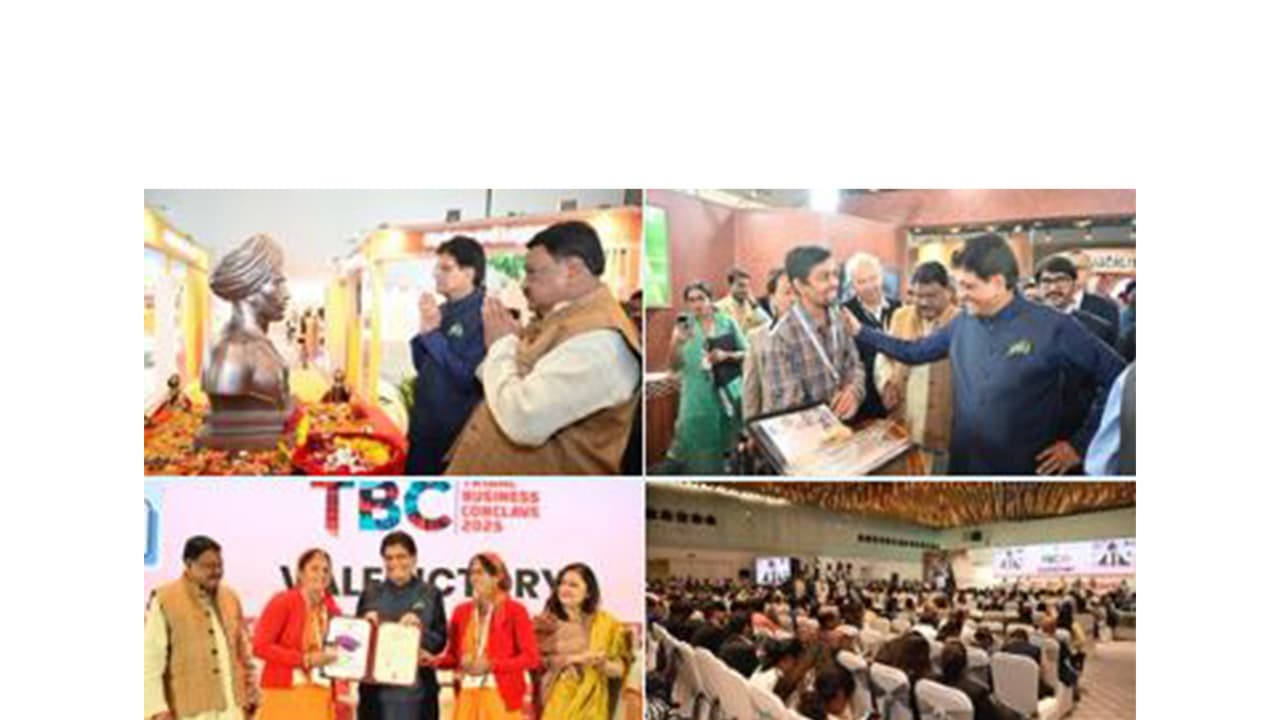Union Minister Piyush Goyal announced full government support for tribal products with export potential, utilizing e-commerce and global trade networks. Speaking at the Tribal Business Conclave, he unveiled a new export promotion scheme.
Union Minister of Commerce and Industry Piyush Goyal has said that all tribal products with export potential will be fully supported by the Department through various channels, including e-commerce platforms, international warehouses for product display and sales, as well as wholesale and retail trade networks. Minister Goyal said this while addressing the Tribal Business Conclave 2025 in New Delhi on Wednesday in the presence of Union Minister of Tribal Affairs Jual Oram.
Organized by the Department for Promotion of Industry and Internal Trade (DPIIT), Ministry of Commerce and Industry, in collaboration with the Ministry of Tribal Affairs, the conclave marked a historic moment during Janjatiya Gaurav Varsh, commemorating the 150th birth anniversary of Birsa Munda. Commerce Minister informed the Conclave that a scheme is currently being developed to strengthen export promotion efforts to ensure that tribal products gain the visibility and market access they rightfully deserve in both domestic and global markets.
Government’s Commitment to Tribal Upliftment
Minister Goyal said that both domestic and international markets offer immense opportunities for tribal goods and crafts, and that the Government is taking necessary measures to harness this potential in the coming years. The Minister emphasised that the Prime Minister believes that the nation can truly prosper only when the indigenous people prosper. He said that India’s growth and development depends on ensuring that progress reaches every household, particularly those in tribal and remote regions. Goyal reiterated that the upliftment of tribal and indigenous communities remains a top priority for the Government, reflecting its commitment to inclusive and sustainable development.
Tributes to Birsa Munda and Tribal Resilience
Goyal paid tribute to Birsa Munda and said that he showed direction and leadership to the tribal community. He added that the nation must draw inspiration from Birsa Munda’s life and follow his footsteps to uplift the tribal community, enhance livelihoods, and ensure that every tribal household is filled with happiness and prosperity. Goyal recalled Birsa Munda’s words, “Our land, our kingdom,” and said that the tribal community has historically faced immense deprivation and hardships.
The Minister lauded the tribal community for preserving its values, handicrafts, and traditional skills despite numerous challenges. He said that the way tribal communities have kept their history and heritage alive through resilience and dedication is truly commendable. He expressed deep respect for the strength and determination of the tribal community and said that their contribution to India’s cultural and social fabric is invaluable.
Collaborative Efforts and Key Initiatives
Goyal noted that the Ministry of Tribal Affairs and the Department of Commerce have jointly played a pivotal role in promoting trade and commerce of tribal and indigenous products. He said that schools, colleges, universities, trade bodies, and government institutions have together ensured that quality tribal products from the remotest corners of the country reach marketplaces and consumers across India.
The Minister highlighted that the Government has implemented various schemes and initiatives aimed at improving the welfare of tribal communities. He noted that the President Droupadi Murmu, stands as a proud and capable representative of both the nation and the tribal community. He mentioned that 3,900 Van Dhan Kendras have acted as catalysts for the upliftment of 12 lakh members of the tribal community.
Goyal informed that the budget allocation for the Ministry of Tribal Affairs has been increased by 50 per cent this year. He added that under the PM-Janman Yojana, approximately 50 lakh families belonging to particularly vulnerable tribal groups have benefitted, with Rs 24,000 crore disbursed to improve their quality of life. He said that the tribal community of India is deeply proud of its roots, culture, and traditions. He informed that the fee for obtaining Geographical Indication (GI) tags has been reduced by 80 per cent–from Rs 5,000 to Rs 1,000–to encourage more tribal products to be registered and to ensure that India’s history and traditions are preserved through their crafts and heritage.
Vision for a Global Market: ‘Van Dhan to Vyapar Dhan’
Concluding his address, Goyal called for the transformation from “Van Dhan to Vyapar Dhan,” envisioning that tribal and indigenous products should reach international platforms, truly realising the vision of “Local Goes Global.” He urged all stakeholders to work together to achieve this shared goal of empowering tribal communities and showcasing their craftsmanship to the world.
Highlights of the Tribal Business Conclave
FICCI and PRAYOGI also supported the conclave as Industry Partner and Knowledge Partner, respectively. The event celebrated tribal resilience and creativity while positioning tribal enterprise at the heart of India’s development agenda for Viksit Bharat @2047. The event witnessed participation from over 250 tribal enterprises, with 150 exhibitors and more than 100 tribal start-ups showcasing their innovations at the “Roots to Rise” pitching platform. The initiative provided a direct connection between entrepreneurs, investors, corporates, and government buyers, creating a vibrant ecosystem for collaboration and growth.
The conclave included six high-impact panel discussions and four masterclasses that engaged more than 50 eminent voices from government, academia, and industry. The sessions focused on themes such as investment and partnerships, skilling and empowerment, sustainability and geographical identity, and branding and market innovation. Buyer-seller meets were also organised to create actionable pathways for market access, skill development, and policy recommendations aimed at strengthening tribal value chains from villages to global markets. (ANI)
(Except for the headline, this story has not been edited by Asianet Newsable English staff and is published from a syndicated feed.)
